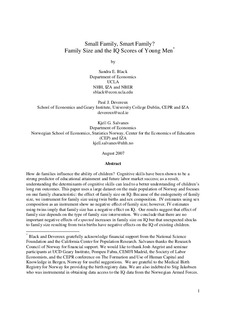| dc.contributor.author | Black, Sandra E. | |
| dc.contributor.author | Devereux, Paul J. | |
| dc.contributor.author | Salvanes, Kjell Gunnar | |
| dc.date.accessioned | 2015-09-09T12:27:07Z | |
| dc.date.accessioned | 2015-09-10T10:21:18Z | |
| dc.date.available | 2015-09-09T12:27:07Z | |
| dc.date.available | 2015-09-10T10:21:18Z | |
| dc.date.issued | 2010 | |
| dc.identifier.citation | The Journal of human resources 2010, 45(1):33-58 | nb_NO |
| dc.identifier.issn | 0022-166X | |
| dc.identifier.uri | http://hdl.handle.net/11250/299317 | |
| dc.description | -This is the author's version of the article" Small Family, Smart Family?
Family Size and the IQ Scores of Young Men", J. Human Resources Winter 2010 vol. 45 no. 1 33-58. | nb_NO |
| dc.description.abstract | This paper uses Norwegian data to estimate the effect of family size on IQ scores of men. Instrumental variables (IV) estimates using sex composition as an instrument show no significant negative effect of family size; however, IV estimates using twins imply that family size has a negative effect on IQ scores. Our results suggest that the effect of family size depends on the type of family-size intervention and that there are no important negative effects of expected increases in family size. However, unexpected shocks to family size resulting from twin births have negative effects on the IQ scores of existing children. | nb_NO |
| dc.language.iso | eng | nb_NO |
| dc.publisher | University of Wisconsin | nb_NO |
| dc.title | Small family, smart family? Family size and the IQ scores of young men | nb_NO |
| dc.title.alternative | Small family, smart family? | |
| dc.type | Journal article | nb_NO |
| dc.type | Peer reviewed | |
| dc.date.updated | 2015-09-09T12:27:07Z | |
| dc.source.pagenumber | 33-58 | nb_NO |
| dc.source.volume | 45 | nb_NO |
| dc.source.journal | The Journal of human resources | nb_NO |
| dc.source.issue | 1 | nb_NO |
| dc.identifier.doi | 10.3368/jhr.45.1.33 | |
| dc.identifier.cristin | 545208 | |
